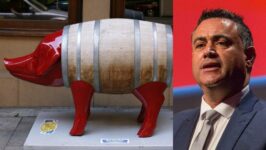The Legalities Around Pork Barrelling in NSW

Pork barrelling is the distributing of public money to fund projects in government-held electorates and marginal seats for political gain, or as current NSW premier Gladys Berejiklian puts it, it’s about making “commitments to the community in order to curry favour”.
This misallocation of public funds to benefit partisan interest to the detriment of making such decisions based on merit is nothing new in the state of NSW. However, the blatant justifications of the practice by the current Coalition government are.
Since last November, numerous instances of senior ministers partaking in these scenarios have been uncovered, and yet, rather than shirk away from the allegations over what the majority of the public perceives as misconduct, the government has persistently asserted it’s done nothing wrong.
In relation to her own currying of favour, Berejiklian acknowledged that it’s “not something the community likes”, but it was an accusation she would wear. And she further asserted that “it’s not an illegal practice”, and, unfortunately, “it does happen from time to time by every government”.
For his part, NSW deputy premier John Barilaro revels in the politically profitable distribution of public funds. In early 2019, he quipped that his nickname is “Pork Barrel-aro”, while, earlier this year, he stated that “what we call pork barrelling is investment”.
“You want to call that buying votes,” the deputy premier boldy said, “it’s what the elections are for.”
Pork pies
The NSW Public Accountability Committee inquiry into grants programs found late last year that in the lead up to the last state election, the Berejiklian government had distributed 95 percent of $252 million from the Stronger Communities Fund to local governments in Coalition voting regions.
The premier signed off on $141.8 million of these grants herself. Her office was then found to have breached the law by shredding documents and deleting files relating to the grants she approved. And Barilaro signed off on $61.3 million worth of these “investments”.
But the pork didn’t end there.
In February, it came to light that the state Coalition had been currying favour with arts grants, as well as being up to its neck in the deceitful distribution of bushfire relief, with Barilaro involved in the allocating of $177 million for 71 projects, with only $2.5 million making it to Labor seats.
Indeed, when it came to the 2019-20 bushfires, the Blue Mountains was one of the hardest hit regions in the state. Yet, despite the Labor-held seat having been crippled by two megafires, the Coalition couldn’t find it within itself to grant it any relief funding whatsoever.
A watchdog with teeth
NSW Greens MLC David Shoebridge chairs the Public Accountability Committee. He told Sydney Criminal Lawyers last week that despite the premier’s protestations around pork barrelling being legal, it is very much outlawed by the Act that governs the NSW anti-corruption watchdog.
“It’s my view that the conduct we’ve seen by the Berejiklian and Barilaro government has obviously met the definition of corrupt conduct under the ICAC Act,” said the Greens justice person. “However, ICAC is the ultimate judge of that.”
Section 8 of the Independent Commission Against Corruption Act 1988 (NSW) outlines the general nature of corrupt conduct, which includes “any conduct of a public official that constitutes or involves the dishonest or partial exercise of any of his or her official functions”.
However, according to Shoebridge, “what is missing in NSW is a legal consequence.” So, while pork barrelling may be considered corrupt conduct under the ICAC Act, there is no actual offence for the practice of it on the books. And this is why Berejiklian can make her assertion that it’s legal.
Misconduct in public office
Crikey legal expert Michael Bradley takes the argument further. He points to the NSW Ministerial Code of Conduct, which was created by section 9 of the ICAC Act, as containing provisions that lead to pork barrelling being unlawful, but again fails to make it a crime in itself.
The lawyer points to clause 6 of the code, which states “a minister, in the exercise or performance of their official functions, must not act dishonestly, must act only in what they consider to be the public interest, and must not act improperly for their private benefit or for the private benefit of any other person.”
As Berejiklian openly admitted to pork barrelling in the case of the Stronger Communities Fund, Bradley asserts, she did not act in the public interest, but rather distributed the grants in the private interests of her party.
Bradley further posits that this could then constitute the common law offence of “misconduct in public office”. Penalties for common law offences are “at large”, which means that the penalty that applies to any of these offences has no limit.
The elements of the offence that capture the nature Berejiklian’s behaviour, the lawyer continues, are “wilfully”, “intentionally” and “culpably”, which is especially so for Stronger Communities as the funds were supposed to help amalgamating councils, yet they weren’t used in this manner.
Criminalisation unlikely
The initial report on the distribution of NSW grants concluded that the Stronger Communities Fund “morphed into a brazen pork-barrel scheme”. And the Public Accountability Committee handed over its findings to the ICAC to consider in late May.
Right now, pork barrelling is part and parcel of the Australian political landscape. Not only was it rife in the lead up to the last state election, but the Morrison government was up to the same tricks right before the May 2019 federal election, as it was favourably distributing sports and carpark grants.
Yet, as Shoebridge mentioned, the real issue is pork barrelling doesn’t constitute a specific offence.
And the problem here is neither major party wants to criminalise the practice once it obtains power, as it too wants to curry favour in much same manner in order to shore up its re-election next time the vote comes round.
Images: “Pig #36” by Skrewtape is licensed under CC BY-SA 2.0. “Photograph of John Barilaro speaking at the CeBIT 2016 StartUp Conference” by CeBIT Australia is licensed under CC BY-SA 2.0.
2023 Anti-Pork Barrelling Bill
The NSW Government created a new anti-pork barrelling bill in 2023, aimed at introducing new laws to strengthen the governance of the grants system. After numerous scandals, reports, and misallocations of government funding, the bill is designed to make grant information accessible to the public so Australian residents can see where their hard-earned tax money is going.
Disaster grants are classified as ‘high risk’ and require approval from the auditor general and ministers. Furthermore, any minister or official who approves or disapproves a grant must also provide full transparency regarding the ethical and efficient use of taxpayer money.
The Government Sector Finance Amendment (Grants) Bill 2023 (NSW) was created based on the findings of the Independent Commission Against Corruption, which found that more regulation of pork barrelling was needed to prevent corruption and misuse of money.
The proposed bill commenced in July 2023, ensuring that ministers are not allowed to approve grants unless they achieve ‘value for money’. The new bill also outlined the key principles in the Grants Administration Guide, including achieving outcomes and benefits consistent with the government’s objectives, collaborating with stakeholders, understanding the associated risks of the grants, and providing transparency to the public.
2024 Independent Pork Barrelling Act
Pork barrelling, or the misuse of public money, has remained in the headlines in Australia in recent years. The NSW Independent Commission Against Corruption highlighted the misuse of funds in the government and how the public saw the fundamental flaw in the country’s democracy, with more than 81% of Australians considering using public money to win votes as corrupt.
Furthermore, large organisations like Coles and Woolworths, have used their extremely wealthy CEOs to jack up prices while pocketing the excess funds. Other incidents, such as the $660 million car park scandal and the wasted $5 billion of allocated funds for Western Sydney projects, highlight how pork barreling has become commonplace in our society.
The misuse of public funds wastes public money that the country desperately needs elsewhere, combined with the public’s (rightful) distrust in democracy.







